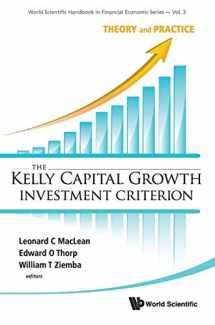
KELLY CAPITAL GROWTH INVESTMENT CRITERION, THE: THEORY AND PRACTICE (World Scientific Handbook in Financial Economic Series, 3)
Book details
Summary
Description
This volume provides the definitive treatment of fortune's formula or the Kelly capital growth criterion as it is often called. The strategy is to maximize long run wealth of the investor by maximizing the period by period expected utility of wealth with a logarithmic utility function. Mathematical theorems show that only the log utility function maximizes asymptotic long run wealth and minimizes the expected time to arbitrary large goals. In general, the strategy is risky in the short term but as the number of bets increase, the Kelly bettor's wealth tends to be much larger than those with essentially different strategies. So most of the time, the Kelly bettor will have much more wealth than these other bettors but the Kelly strategy can lead to considerable losses a small percent of the time. There are ways to reduce this risk at the cost of lower expected final wealth using fractional Kelly strategies that blend the Kelly suggested wager with cash. The various classic reprinted papers and the new ones written specifically for this volume cover various aspects of the theory and practice of dynamic investing. Good and bad properties are discussed, as are fixed-mix and volatility induced growth strategies. The relationships with utility theory and the use of these ideas by great investors are featured.


We would LOVE it if you could help us and other readers by reviewing the book
Book review



